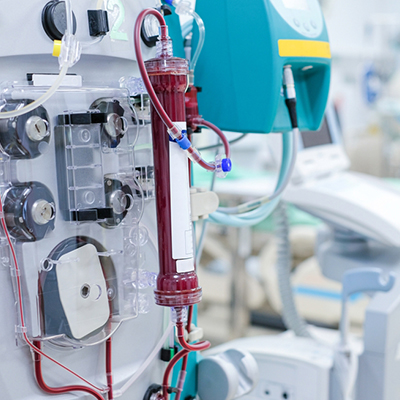Hemodialysis Treatment in Anantapur
Hemodialysis treatment in Anantapur, alternatively referred to as haemodialysis or simply dialysis, is a medical procedure designed to filter the blood of individuals whose kidneys are not functioning properly at Best dialysis centers in Anantapur. This method serves to replicate certain functions of the kidneys by employing a machine that cleanses and purifies the blood. During hemodialysis, a machine removes waste products, excess salts, and fluids from the bloodstream when the kidneys are unable to perform these tasks effectively. This treatment option is utilized for managing advanced kidney failure and can enable individuals to maintain an active lifestyle despite the challenges posed by impaired kidney function.
Use of Hemodialysis
Hemodialysis is a medical procedure designed to remove waste products and excess fluids from the bloodstream, functioning similarly to healthy kidneys. This treatment by Best Nephrologist in Anantapur plays a crucial role in regulating blood pressure and maintaining the balance of essential minerals, including potassium, sodium, and calcium, within the blood.

Factors to consider for hemodialysis
Hemodialysis serves as an effective method for removing waste products and excess fluid from the bloodstream and Kidney Treatment in Anantapur. Nevertheless, it does not entirely replicate all functions of the kidneys, thus it is not regarded as a definitive cure for advanced chronic kidney disease (CKD) or kidney failure. This treatment can be administered in various settings, including hospitals, dialysis centers, or at home.
Typically, sessions at a dialysis center occur three times a week, with each session of Kidney dialysis in Anantapur lasting between three to four hours. In cases of acute kidney injury (AKI), hemodialysis may be required temporarily until kidney function improves.
However, in situations where kidney disease gradually progresses to failure, the kidneys are unlikely to recover, necessitating ongoing dialysis for the remainder of the patient's life unless a kidney transplant is performed. It is important to note that hemodialysis can lead to side effects. Among the most frequently reported side effects are:
- Obstruction at the site of your vascular access (entry point).
- Muscle spasms
- Low blood pressure
- Feelings of weakness, lightheadedness, or queasiness
- Hemorrhage
Your dietary regimen is expected to differ from the one you adhered to prior to commencing dialysis. While some food items may be restricted, it is essential to ensure adequate intake of protein and calories to support your overall health. The renal dietitian at your facility along with Dr. M. Surendra Babu will assist you in creating a meal plan tailored to your specific requirements. Numerous individuals undergoing dialysis are able to maintain their employment. However, if your occupation involves significant physical exertion, such as heavy lifting or digging, it may be necessary to modify certain responsibilities.
